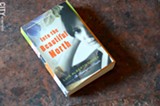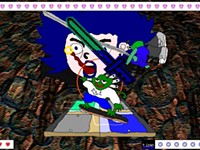[
{
"name": "500x250 Ad",
"insertPoint": "5",
"component": "15667920",
"parentWrapperClass": "",
"requiredCountToDisplay": "1"
}
]
This year's selection for the city-wide book club, "If All of Rochester Read the Same Book..." takes readers on a journey from a rural Mexican town in trouble, across the border into an America we see through fresh eyes. "Into the Beautiful North," which was also selected for the National Endowment for the Arts' Big Read program, is an enthralling, epic story, one of daring and romance, of disillusionment and expanded experience. The book's author, Luis Alberto Urrea, will visit Rochester this week. City Newspaper talked to him about the book, the real-life origins of parts of the story, and what the work has to teach us about each other.
The story opens in the remote Mexican village of Tres Camarones, which most of the men have left to pursue work north of the border. In time, drug dealers and dirty cops descend on the town and threaten the remaining population. Inspired by a screening of "The Magnificent Seven," the intrepid yet circumstantially adrift 19-year-old Nayeli devises a plan. She and three of her best friends will travel north and return with seven Mexican men to rid the town of the bandits.
That covers the surface purpose of the journey, but crucial undercurrents of the story include closure-seeking, and the main character's growth. "The entire journey is kind of a Joseph Campbell myth," says Urrea. "In many ways, I was thinking about King Arthur, or Beowulf, or Mad Max. They're just not written about women," he says. By the end of the book, Nayeli has transitioned to become the warrior she seeks. Though Nayeli does bring men back — lots of them — to Tres Camarones, they "aren't going to stand in for her, they're actually going to back her," he says.
This is the 13th year for Writers & Books' city-wide reading program, the goal of which is to "bring people together to talk about real-world issues and their own experiences," says Karen van Meenan, director of special projects at Writers & Books. The organization has organized a calendar of events around the program, including book discussions and related activities in the community.
"In terms of choosing 'Into the Beautiful North' specifically, we were attracted to the issues around immigration," says van Meenan. "This is as complicated and important a topic in our country today as it ever was."
Though the Rochester area has a good number of migrant workers, "it is not an issue that we talk about openly very often," she says. "Much of the programming around the book addressed this, from a Spanish-language discussion with migrant workers to the screening of a documentary film on local female migrant workers."
Despite the heavy subject matter, Urrea's sharp wit keeps readers chuckling and his romantic storytelling keeps us sighing at almost every turn of the page. The author chose to compassionately convey the depth of each complicated situation. Through the book, Urrea wished to dispel "whatever idiotic, monolithic picture we have of anybody else," he says. "They are multifaceted just like we are, on either side."
When the nearly unsinkable Tacho — the sole male in the quartet of travelers, who wishes to leave behind the doldrums of small-town life and its homophobic slurs — has a language-based misunderstanding with a post-9/11-hysterical border control, the resulting scuffle is balanced later by the kindness of a close-to-retirement, burned-out border control officer who is astonished by the kids' story and journey. A startling interaction between Tacho, Nayeli, and some documented Mexican-Americans contrasts with many random acts of sweetness from strangers.
Like other elements of the novel, Urrea drew the incident with the documented workers from real life. The owners of a Mexican restaurant in Chicago, where Urrea resides, knew he was an author and wished to see his writing. Urrea gave them a copy of his novel, "The Devil's Highway," a true and wrenching story about illegal border crossing, and was surprised to learn that they were deeply offended. "They hate the undocumented," he says, "because they had done everything the 'right' way."
The greater focus of the last section of the novel is upon Nayeli and Tacho's long trip east to Kankakee, a small town outside of Chicago from which Nayeli's father last sent a postcard. They depart as the rest of the group organizes a horde of homesick Mexican men responding to their call for warriors. Nayeli and Tacho's journey across the west is one of nonstop marvels and increasing disillusionment as their perceptions of the United States dissolve into frequent bafflement with its strange and often ridiculous realities. The divide between the two worlds contracts and expands over and over as they witness America and interact with others.
Nayeli's act of confronting her father, though done with nobility and grace, is quite damning, and marks the epitome of this divide. Nayeli, too, is based on a real young woman of the same name, whom Urrea met while doing relief work in a Tijuana garbage dump. The author himself was born in Tijuana, and though he immigrated to California at age 4, he grew up between the two countries.
It was the real Nayeli's grandfather who was swallowed up by The North. "It's a very specific story in my mind of her tragedy, but I think it became emblematic of all kinds of border sorrow," says Urrea. There is a feeling that something must follow this untidy closure, which Urrea might address in the book's possible sequel.
The town of Kankakee, where Nayeli discovers her father, is based on the real Kankakee, which has not only a very successful revitalization story, but also provides a hopeful handbook for forging a successfully multicultural town. The inhabitants are a second group of heroes in the novel, and the real-life town has begun a dialogue with Kalamazoo, Michigan, after the latter population chose "Into the Beautiful North" for its city-wide reading program.
Author Luis Urrea will visit Rochester this weekend and participate in multiple book readings, signings, and discussions from Wednesday, March 27, through Friday, March 29. Visit wab.org for a full calendar of events and details.
Speaking of...
Latest in Culture
More by Rebecca Rafferty
-

Beyond folklore
Apr 4, 2024 -

Partnership perks: Public Provisions @ Flour City Bread
Feb 24, 2024 -

Raison d’Art
Feb 19, 2024 - More »






